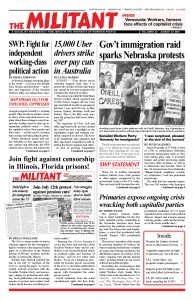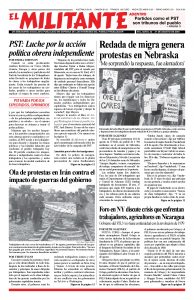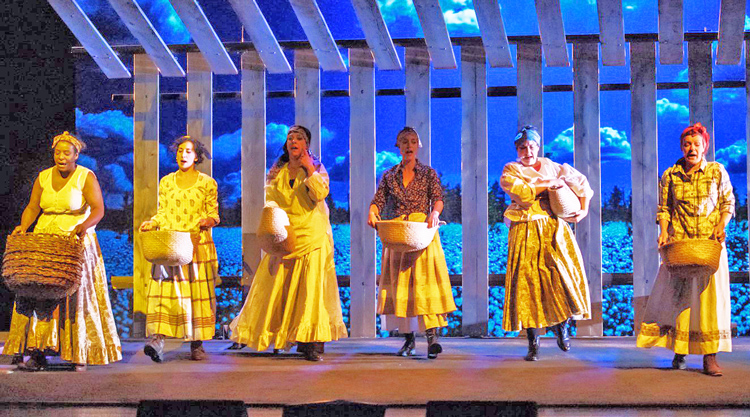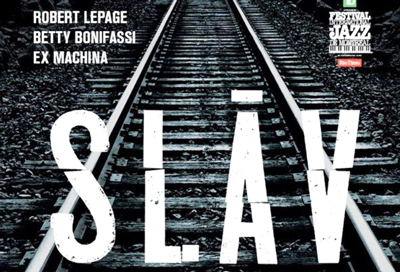MONTREAL — Artists, performers, writers, political figures in Quebec and others are speaking out against a campaign here to censor the work of artists they accuse of “cultural appropriation.”
“SLAV,” shown as part of the Montreal International Jazz Festival, is “a theatrical odyssey based on slave songs,” the show’s organizers explain, a journey “through traditional Afro-American songs, from cotton fields to construction sites, railroads, from slave songs to prison songs.”
“Leave the artists in peace,” Black actor Frédérick Pierre wrote on his Facebook page. “Let the white artists be touched and moved by Black history and the songs it generated.”
On June 26, about 100 protesters organized by the self-named SLAV Resistance Collective protested in front of the theater doors on opening night. The protesters, both Black and Caucasian, shouted, chanted and waved placards accusing internationally renowned Quebecois producer Robert Lepage and lead singer Betty Bonifassi of being “racists” and of appropriating Black history because they are “white” and the show didn’t have a majority Black cast.
On July 4, Montreal Jazz Festival officials cancelled the production after only two of the scheduled 16 shows. More than 8,000 tickets had already been sold. Officials apologized to anyone who they said might have been offended by the performance.
“Everything that led to this cancellation is a direct blow to artistic freedom,” Lepage said in a widely circulated statement. “When we are no longer allowed to step into someone else’s shoes, when it is forbidden to identify with someone else, theatre is denied its very nature … and is thus rendered meaningless.”
“I will always demand the right for theatre to talk about anything and anyone,” he said.
Bonifassi, who has spent two decades researching and singing these songs and others like them in shows and on recordings, also spoke out, condemning “censorship” by the Jazz Festival that “violated freedom of expression.”
In a Montreal Gazette interview in 2014, Bonifassi explained that her Slavic roots influenced her passion for songs that have emerged from slavery in many parts of the world. “My mother comes from Serbia, and all those people from the Balkan empire were slaves for all of the European empires for six centuries,” she said.
“I am for unity, not division,” said Kattia Thony, one of the two Black performers in “SLAV.” She said she would not apologize for her role and had not only a right to participate in the production but also the responsibility to do so because one scene depicted the struggle of Haitian slaves, the country of her ancestors, the first Black nation to free itself from colonial subjugation.
A few weeks later, as the controversy over cancellation of “SLAV” made international headlines, Lepage was forced to cancel “Kanata,” his next show, scheduled for Paris in December. Financial backers in the U.S. pulled out. “Kanata” depicts the European settlers who colonized Canada and the destructive effects on Native people, including scenes about the oppression of Native people today. A number of Native artists criticized Lepage for not including Native performers from Canada, but they supported the production of “Kanata.”
Support for free artistic expression
Maka Kotto, a Parti Quebecois member of the Quebec National Assembly who is Black, described the Jazz Festival’s censorship of “SLAV” as “a totalitarian mechanism that needs to be clearly denounced in order to preserve our freedom of artistic creation.”
Writing in the Toronto Star, theater director Nancy Miller condemned “the misguided notion of citing cultural appropriation to impose artistic tyranny and censorship on other ethnic groups.” She noted Lepage’s production of Shakespeare’s “Coriolanus,” currently showing at Canada’s Stratford Festival, starring a Black actor in the role of a Roman general, was getting rave reviews.
“It’s really wrong. It’s an attack on freedom of expression! Don’t they realize that Blacks would not have gotten where we are if we had to do it alone,” Walmart worker Lancuse Dèmosthène told the Militant. “Does this mean I can’t take up other causes? The rights of gays and lesbians is something I hold dear.”
Four other theaters in cities around Quebec insist they have no plans to cancel performances of “SLAV” in 2019.
“It’s a matter of artistic freedom for a theater to show what it wants to show,” said Marie-Pierre Simoneau, director of La Maison des arts Desjardins in Drummondville. “We still have the intention of presenting the show,” said David Laferrière, general artistic director of the Gilles-Vigneault Theatre in St. Jerome. “I just want to show art.”
“We can’t start preventing and blocking the freedom of expression,” said CAQ (Coalition for the Future of Quebec) leader François Legault following the cancellation of “Kanata.” He added, “Artists like Robert Lepage have the right to express themselves.” CAQ, a conservative political party, is leading in the polls weeks before the Oct 1. provincial election.
“Working people have a big stake in the fight to defend the right to unfettered artistic expression,” said Beverly Bernardo,” Communist League candidate in the Montreal Viau constituency. “It is the working class that is the guardian and bearers of culture today.
“Workers need the widest possible access to culture and the arts. Censorship — in the name of stopping so-called cultural appropriation or any other excuse — is dangerous for working people,” Bernardo said. “And it gives our class enemies more opportunity to reduce the political space we need to organize and fight to defend ourselves against attacks by the bosses and their governments. The Communist League stands against all forms of censorship.”
Annette Kouri contributed to this article.



